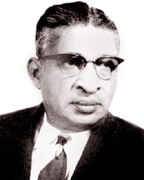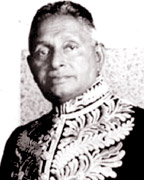UNP at crossroads
 Serious
doubts emerged this week as to whether the major opposition United
National Party (UNP) would be able to hold its official May Day rally.
It had planned to hold its annual show in Jaffna, but doubts emerged
whether members would attend. Thereafter the UNP leadership began to
express fears about security issues. Serious
doubts emerged this week as to whether the major opposition United
National Party (UNP) would be able to hold its official May Day rally.
It had planned to hold its annual show in Jaffna, but doubts emerged
whether members would attend. Thereafter the UNP leadership began to
express fears about security issues.
Meanwhile the dissident Sajith Premadasa faction has said it will go
ahead with a rally at Hulftsdorp to commemorate the death anniversary of
Sajith’s father, President Ranasinghe Premadasa.
This commemoration may be taking on the appearance of a dissident-UNP
May Day rally in opposition to the official UNP Jaffna rally. UNP
dissident MP Maithri Gunaratne has requested ‘all those who want a
strong Opposition’ to join the Premadasa commemoration.
May Day rivalry
And while Sajith said the commemoration was not a May Day rally, as
was being claimed by some, he did say that supporters had the right to
walk and to use cars and buses for their transportation, suggesting that
some form of May Day march might take place.

Dudley Senanayake |

SWRD Bandaranaike |

Sir John Kotelawala |
Underlying this May Day rivalry is a deep-seated division within the
UNP, Sri Lanka’s fourth oldest surviving political party. From the
beginning it was a coalition of diverse forces within the political
elite: feudal land-owners, compradore traders and the nascent industrial
bourgeoisie.
It encompassed a range of opinions, from the Sinhalese Buddhist
nationalism of Neel Hewavitarne to the faux-Englishness of John
Kotelawala, from ‘China Dicky’ (RG Senanayake) to ‘Yankee Dicky’ (JR
Jayewardene).
After SWRD Bandaranaike departed with his mainly rural,
petty-bourgeois and peasant following, the UNP consolidated itself
around its core constituencies, with their disparate needs. Over the
years, two competing, but complementary, threads emerged within the UNP
- the foreign-biased, authoritarian JR Jayewardene strand and the more
nationalist, more populist Dudley Senanayake strand.
Both these wings reflected the outlooks of their leaders. Dudley had
natural charisma, arising from his charm and his genuine devotion to
what he saw as the people’s needs. He was more easy-going and more
tolerant of opposing opinions than his rival, and consequently more
democratic. He could afford to be, as he was looked up to in the UNP as
the natural leader.
Party constitution
JR, on the other hand, had little natural appeal. His claims to
leadership were based on his manifold organizational skills. He was
ruthless and controlling. After both the 1956 and 1970 landslide
defeats, it was he who rebuilt the UNP; and it must have been galling to
him that on both occasions, it was Dudley who seemed to profit from his
hard work.
After Dudley’s passing, JR took the helm and remodelled and
modernised the UNP - hitherto a loose collection of notables. He also
incorporated part of Dudley’s populism in his newly-minted ideology.
Unfortunately for the UNP, he also introduced a party constitution which
gave all powers to the leader.
He was opposed by the group loyal to Dudley, led by Dudley’s (then
formidable-looking) nephew Rukman Senanayake - but JR proved the
stronger. Many of the populist (‘Janasammatavadi’) UNPers deserted the
party, but the remainder coalesced around Ranasinghe Premadasa.
JR Jayewardene later - after becoming Executive President - rewarded
Premadasa with the Premiership. Premadasa, for his part, deserted the
democratic tradition of the Dudley wing, while retaining its populism.
It is this fundamental division which is at the root of the current
UNP crisis. The dissident wing, grouped around Sajith, proclaims its
populism and its bonds to Sinhalese nationalism. Party Leader Ranil
Wickremesinghe, who is JR’s nephew, retains the authoritarian basis of
his uncle’s faction. At the same time, he also inherits a more
cosmopolitan world-view, sadly untrammelled by the sensitiveness to
indigenous culture and tradition which his uncle possessed.
Ranil’s ignorance of what is appropriate is revealed by the apparent
invitation to the Tamil National Alliance to join the UNP May Day rally.
This has been seized on by the Sajith wing, who also attack Ranil’s
apparent dedication to the ‘13 plus’ option for devolution (i.e. more
devolution than is currently granted under the 13th amendment to the
constitution).
It is clear that the dissident-UNP is now going back to the
core-values of the Dudley wing, of Sinhalese nationalism. While ideal as
counterweights to Ranil’s Westernised globalisation principles, taken in
isolation from their role in bringing balance to UNP policies, they can
act in detriment to the country’s interest.
Foreign pressure
Sri Lanka is now at the crossroads. If a solution is not found for
the island’s ethnic problems, there is a risk of groups exploiting
ethnic feeling to re-ignite a conflict, which our people do not want and
cannot afford.
When the Indian parliamentary delegation, currently on a fact-finding
visit, said that only a political solution that satisfies the Tamil
community within a united Sri Lanka would solve the problem, they were
merely stating what should be obvious. Accepting this position is not
tantamount to bowing to foreign pressure.
At the same time, the Tamils are not the only minority in the
country. The needs of the other minorities, as well as the wishes of the
majority Sinhalese, have to be catered to. The problem lies in balancing
the multi-faceted wants and aspirations the aspirations of the ethnic
groups which make up our population. Sri Lanka cannot be reduced to a
confederation of ethnic Bantustans and still remain viable.
The government has opted for a Parliamentary solution to this
problem. All ethnic groups and all parties represented in Parliament
will thus have a say in coming to a consensus.
In this context, the UNP has a vital role to play and hence has to
work out its ethnic policy. The UNP is also at the crossroads. It needs
to get its act together, to sort out its internal disputes and
ideological contests and get ready to go down the correct path.
Otherwise, it will be consigned to the dustbin of history. |



